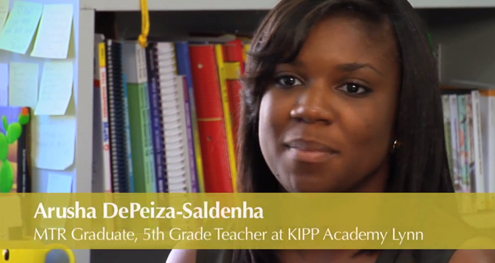Match Charter Residency Program Effective Teacher Training Model
Report Finds Match Charter Residency Program an Effective Model to Equip Teachers for Challenges of Urban Classrooms
Educator preparation program can address shortage of high-quality teachers, deficiencies in traditional education schools
BOSTON – The Match Teacher Residency (MTR) program’s approach to recruiting and training highly effective teachers should be a model for other charter schools, school districts, and traditional schools of education as they face an impending shortage of high-quality teacher candidates, according to a new Pioneer Institute report.
“The Match Teacher Residency program is filling a gap in the teacher pipeline,” said Cara Candal, author of Matching Students to Excellent Teachers: How a Massachusetts Charter School Innovates with Teacher Preparation. “The gap is between those with a broad academic and progressive ‘ed school’ education grounded in pedagogy and those who are prepared, from day one, for the practical rigors of teaching in a particular kind of classroom.”
Begun in 2008, MTR is an intensive course of study and practice that trains effective novice teachers. It draws from a pipeline of candidates working in the schools’ own tutor corps. Residents sign on for a full-time year of tutoring, studying, and practice teaching on a Match campus.
Unlike more traditional teacher preparation programs that require approximately 12-15 weeks of student teaching that occur late in a teacher’s overall education program, Match teacher residents benefit from over 80 hours of practice teaching in front of actual students in the first semester of the program, and receive precise and actionable feedback from expert faculty on every aspect of their practice.
“We have a framework, boiled down to six big buckets of what we think constitutes good teaching,” said MTR Director Orin Gutlerner. “And we work to make sure that all of our coaches are fully aligned to help teachers make the right choices at the right time.”
In the 2012-13 school year Match 10th graders placed first state-wide among high schools where more than 70 percent of students are low-income; they placed 22nd among all 305 high schools in the Commonwealth. Match High School has been cited by the US Department of Education as one of the nation’s eight best charter high schools.
Founded in 2000, Match Education is a network of high performing charter public schools (Match High School, Match Middle School, and Match Community Day), focused on serving poor and minority students in urban centers, many of whom enter with significant learning gaps as a result of having been underserved in their previous schools.
Match seeks teacher candidates who are comfortable with its “no excuses” -approach, a departure from the more progressive brand of pedagogy often taught in schools of education. At Match, instruction tends to be teacher centered, student behavior is closely monitored, and all students take a college preparatory curriculum with longer days and school years.
Teacher Residents live in tutor corps-provided housing within or near a Match school. Since 2012, successful teacher residents have had the opportunity to earn a master’s degree (Master’s of Effective Teaching) through Match’s own Charles Sposato Graduate School of Education.
“MTR Teachers need to understand how to write lesson plans, engage in long-range instructional planning, review student-level data that will help to drive instruction, and establish a positive and productive classroom culture,” said Scott McCue, MTR’s Chief Operating Officer. “Candidates who are strongest out of the gate tend to have experience working with low-income populations and are open to receiving and integrating large amounts of feedback about their practice and the capacity to withstand the emotional and other difficulties of teaching without giving up – grit.”
Another benefit of the MTR model is that it is far less expensive than university-based programs with high tuitions. Reduced student loan debt can make it easier to retain high-quality teachers.
Match has expanded its successful model to other charter and traditional public school districts in Boston and in cities across the country such as Houston, New Orleans, Denver, and Chicago.
Key recommendations include:
- Share Best Practices—Other charter schools, traditional districts, and traditional schools of education should incorporate aspects of MTR’s teacher training program, including its emphasis on feedback, coaching and ample practice with actual students, to ensure a more effective teaching force.
- Focus on Outcomes—Match Education and MTR should continue to track student outcomes and MTR graduates’ career paths to inform their strategy for retaining effective teachers, and fill the gap in the high-quality teacher pipeline.
- Bring the Program to Scale—Philanthropists and public providers should invest in MTR to make the program self-sustaining, and state and federal governments should look to MTR’s low-cost model as a viable alternative to traditional schools of education for retaining high-quality teachers.
Pioneer recently published a report, Matching Students to Excellent Tutors: How a Massachusetts Charter School Bridges Achievement Gaps, recommending Match-style tutoring as a less expensive and more effective approach to education reform than widely accepted strategies such as reduced class size and extended school days. Other related Pioneer publications include Charter Schools in New Orleans: Lessons for Massachusetts, Looking Back to Move Forward: Charter School Authorizing in Massachusetts, and Preserving Charter School Autonomy.
Cara Stillings Candal is director of research and curriculum at the Center for Better Schools/National Academy for Advanced Teacher Education. Previously, she was a high school teacher and research assistant professor at the Boston University School of Education. She is editor of the book Partnering for Progress: Boston University, The Chelsea Public Schools and Twenty Years of Urban Education Reform.
Pioneer Institute is an independent, non-partisan, privately funded research organization that seeks to improve the quality of life in Massachusetts through civic discourse and intellectually rigorous, data-driven public policy solutions based on free market principles, individual liberty and responsibility, and the ideal of effective, limited and accountable government.



